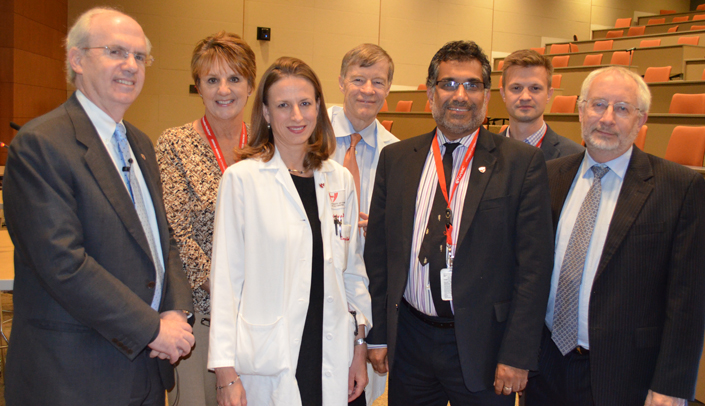The successful treatment of two men who had Ebola has turned UNMC and Nebraska Medicine into the go-to institution of the world for advice on care and protocols.
“Nebraska has set the gold standards for Ebola care,” said Philip Smith, M.D., professor of Internal Medicine, Division of Infectious Disease, and medical director of the Biocontainment Unit. “We embody everything that went right.”
Dr. Smith was part of a five-person panel of experts who spoke to more than 60 UNMC students and faculty members at a 90-minute “Ebola Explained” discussion last week.
Watch the presentation here. (A UNMC login is needed to view the discussion.)
The medical center received extensive global media attention – via television, print and social media – over the two-month period, said UNMC Chancellor Jeffrey P. Gold, M.D.
“We were in the top 10 tweets and were number three for a while – only exceeded by the National Football League,” he said before showing a video of news reports that highlighted UNMC’s heroic response.
Dr. Gold praised Dr. Smith’s foresight in building the unit.
“Not every institution in the U.S. had this vision and could step up and do the cutting-edge research, education and patient care to protect our citizens. That’s what an academic medical center does.”
Bradley Britigan, M.D., dean of the UNMC College of Medicine and president of Nebraska Medicine, served as moderator for the panel of experts that included:
- Ali Khan, M.D., M.P.H., dean, UNMC College of Public Health and former director of the Office of Public Health Preparedness and Response at the Centers for Disease Control and Prevention;
- Dr. Smith;
- Angela Hewlett, M.D., assistant professor of internal medicine-infectious diseases, and associate medical director of the Biocontainment Unit;
- John Lowe, Ph.D., assistant professor, environmental, agricultural and occupational health; associate director of research, Biocontainment Unit, director of Public Health Training and Exercise Programs, Center for Preparedness Education;
- Shelly Schwedhelm, director of the emergency department’s trauma and emergency preparedness at Nebraska Medicine.
Although some team members or family members had been shunned because they were working in the Biocontainment Unit, many experienced support and gratitude from the community. And nothing is more complimentary than imitation.
So, two experts were pleased to see three elementary school children dressed in a kid’s adaptation of the yellow biocontainment suit for Halloween.
You know you’ve reached a certain coolness factor when that happens.
Q&A
After briefly explaining their roles, the panelists took questions from the audience:
- Could the virus become natural in the U.S. environment?
“No, it can only be imported. The best way to prevent the disease here is to prevent it in Africa,” Dr. Khan said. - Do airport screenings really help?
“They are not effective,” Dr. Smith said. “They are expensive and may only catch three people per month. It’s most effective to screen in the country of origin. It’s unnecessary to screen asymptomatic people.” - What research is underway?
“Not a lot,” Dr. Hewlett said. “While there has been work with animals, it’s hard to do a large randomized clinical trial because of the limited outbreaks.” - What would happen if a patient showed up at our doorstep, like in Dallas?
“We already have screening protocols established at all entry points to our system,” Schwedhelm said.If, through a series of questions about travel and exposure, the in-take nurse determines the patient is at high risk, the patient and nurse don a mask and the patient is escorted into an isolated room. The nurse puts on personal protective equipment, and then takes vital signs. Lab tests are ordered after a video conference with a physician.
“It could take 72 hours before a person tests positive for Ebola,” she said. “Like in Dallas, no one thought it would happen here. Now every hospital in the country is developing protocols.”
- If the virus doesn’t go through intact skin, why have full protective gear?
“Think about how many times you have touched your face tonight,” Dr. Khan said. “If the virus gets on your exposed skin, you touch it and then rub your eye, that’s all it takes.” - How has this experience impacted your work and personal lives?
“Someone should study that,” Dr. Smith said. “All 40 members of our team paid a price — family, home and work life all suffered, and some felt stigma.”The weight of responsibility to keep the team safe and support them was felt by all the team leaders, Schwedhelm said. “I personally felt a huge accountability for that and it was very emotional for me. We still monitor team members’ temperature so they can continue to do what’s important in their lives.”
The team structure points to Dr. Smith’s genius, Dr. Lowe said. “He chose to build a multidisciplinary team and develop a culture where everyone is heard. Every team member expresses that culture when working with others in the community and it is deeply appreciated.”
- How effective are HIV drugs on Ebola? Like HIV, will the Ebola virus reappear?
“So far we’ve been able to follow about 20 patients and none of them have relapsed,” Dr. Smith said. “Our experts at UNMC do not believe that HIV drugs would work on Ebola.”“We do know that once cured, the immunity is no different from measles — about 10 years,” Dr. Khan said.
